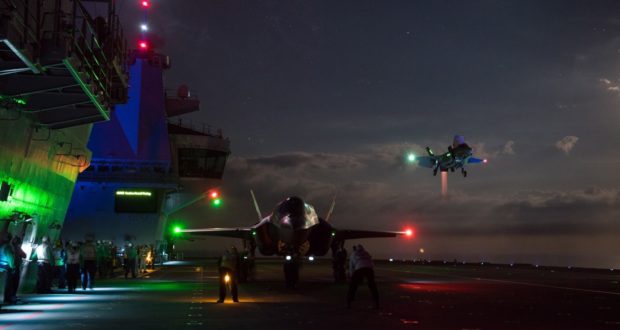3 December, 2018
The Human Security Centre (HSC) has today published ‘Fire and Ice – A New Maritime Strategy for NATO’s Northern Flank’. The paper discusses the current challenge posed by Russia, and the options NATO has for countering it in the Atlantic and northern realms.
Given the recent clash between Russian and Ukrainian forces in the Kerch Strait, it has never been more important to understand the maritime elements of the challenge NATO faces when confronting Moscow. In this timely report, the HSC has examined:
- the regeneration of Russia’s military capabilities and the doctrine they support;
- potential scenarios for the use of military force by Moscow, and;
- the role of NATO maritime power in deterring and, if necessary, countering hostile action by Russia.
Key findings include:
- Were Moscow to launch hostilities, it is likely that Russian forces would be able to overrun vulnerable areas of NATO territory – including the Baltic states of Lithuania, Latvia and Estonia – before adequate reinforcements could be deployed.
- Russian forces would subsequently seek to deter and, if necessary, combat a major NATO response to such an attack. If required, Moscow has the capability to:
- conduct limited interdiction of shipping bringing forces across the Atlantic from the US;
- engage in precision-guided conventional strikes by using cruise and ballistic missiles against militarily, economically and politically sensitive targets in locations across Europe, including the UK;
- hinder NATO access to key sectors of airspace.
- The northern maritime realm would be crucial in such a campaign by Moscow. Submarines and ships of the Northern Fleet would threaten allied shipping and fire cruise missiles at targets on land. Russian Aerospace Force bombers would fly from Arctic circle bases to launch missiles against NATO’s rear area. Land-based ballistic and cruise missiles based in the Kola Peninsula would strike sensitive locations in Norway. Forces based across Russia’s Arctic region would seek to defend the state from NATO counter-attack.
- However, Russia is vulnerable to NATO’s fully mobilised maritime power, and the resurrection of central elements of late Cold War maritime strategy has a significant amount of potential to deter and, if required, counter Russian aggression.
Key recommendations include:
- The UK’s Royal Navy should take the lead in any early effort to counter offensive Russian submarine operations via a multi-national task group centred upon one of the new Queen Elizabeth-class aircraft carriers.
- NATO requires a pro-active strategy to degrade and defend against Moscow’s ship, submarine, air and ground-launched cruise and ballistic missile capability based in and staging out of the Arctic region – a campaign that would require a wartime multi-carrier deployment by the US Navy and the basing of substantial forces in Iceland, the UK and Norway.
- Were Russia to initiate hostilities in Eastern Europe, NATO should adopt a strategy of ‘horizontal escalation’ by widening the conflict to include actions within Russia’s northern maritime approaches – an effort which may include direct strikes against Moscow’s strategic assets.
HSC Senior Fellow and author of the report, Dr Rowan Allport, said:
“The recent Exercise Trident Juncture 2018, the US Navy’s decision to reform its Second Fleet to coordinate North Atlantic operations, and a parallel effort by NATO to set up its own Joint Force Command for the Atlantic, are all encouraging signs that the Alliance is taking the northern maritime realm seriously after a near exclusive focus on Eastern Europe in the wake of Russia’s actions against Ukraine.
However, much more remains to be done. Russia represents at threat to NATO’s sea lines of communication through the use of advanced submarines, is capable of targeting the alliance with a growing arsenal of conventional strategic weapons such as the Kalibr and Kh-101 cruise missiles, and continues to build-up its facilities in the Arctic. A firm commitment is now required by the Alliance to rediscover the forward maritime strategy that helped contribute to winning the Cold War.”
HSC Director and Arctic expert, Dr Dwayne Menezes, added:
“Russia, under Putin, continues to allow dog-whistle politics of civilisational difference and siege mentality to push the boundaries of what might be termed ‘defensive’, and governs with ambitious militarisation within and military adventurism beyond. Thus, even Russia’s most ardent admirers must watch with dismay a great cultural, intellectual, political and economic power of our age reduce itself to a rogue state, repeatedly indulging in insecurity-fuelled thuggery to prove its might and forever at odds with international law and even states that would rather be close trading partners, neighbours and friends. When it comes to the Arctic, however, peace and cooperation has prevailed, not miraculously but by conscious choice and concerted action. After all, when one considers the opportunities and challenges arising from a changing Arctic, it is clear that peace and cooperation is in everyone’s interest. Yet, ensuing as they both do from a delicate balance, it is imperative that the balance be carefully maintained. Moreover, given the Arctic is not removed from, or immune to developments in, the adjacent North Atlantic, Nordic, Baltic and North Pacific regions, it is in the interest of every state, including Russia, for the Alliance to be capable of maintaining the vital balance in an ever-more integrated North.”
The HSC is an independent international affairs think-tank based in London, with interests in foreign, defence and security policy. We produce a wide range of digital publications, submit evidence to parliamentary inquiries and provide advisory support to policymakers.
We also offer commentary to the international media, having appeared on outlets including the BBC, Channel 4, Sky News, Al Jazeera and CNN. Our commentary has been published in The Independent, The Telegraph, The Spectator, The New York Times, The Hill, IB Times and Evening Standard.
To contact one of our experts, please email: simon.schofield@hscentre.org
Image source: Source: DVIDS/Dane Wiedmann
 Human Security Centre Human Rights and International Security Research
Human Security Centre Human Rights and International Security Research




